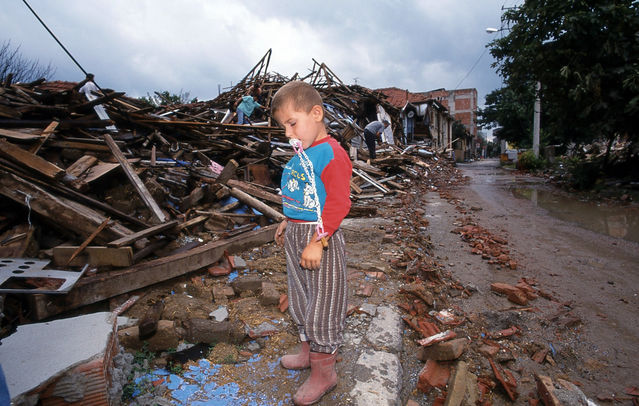Gratitude
Why Do Bad Things Happen to Good People?
Bad things happen for the same reason anything happens.
Posted October 16, 2019 Reviewed by Kaja Perina

“We could bear nearly any pain or disappointment if we thought there was a reason behind it, a purpose, to it.” — Rabbi Harold Kushner, When Bad Things Happen to Good People.
My wife Karin is a much more practically-minded, down-to-earth person than I am. So when she was diagnosed in 2005 in her late thirties with a very aggressive life threatening cancer, she never dwelled on questions like ‘Why did this happen?’ or ‘Why me?’ When people asked her if she struggled with such questions or if she felt a sense of cosmic injustice, her characteristically matter-of-fact reply was “Why not me?”
Karin and I had experienced adversity and big life challenges before, but nothing like this. Not that we were really surprised to be facing such a crisis: neither of us had illusions of immunity to the kinds of adversity we had all too often seen hit others. Like me, Karin worked in a helping profession, so we had both witnessed much tragedy in our work, as well as among friends and relatives. Severe adversity seemed almost overdue for us. It seemed obvious to us that there was no reason we should be exempt from misfortune and tragedy.
For several years following the diagnosis, we expected the worst and lived with tremendous uncertainty.
Thanks to a whole lot of dumb luck, and some remarkable medical breakthroughs, we made it through—though one is never really out of the woods with cancer, and we have had more scares in recent years.
In the initial phases of her illness and treatment, the time of greatest uncertainty and vulnerability, I found myself grasping for reassurance and desperately wanting to believe that everything was somehow cosmically ‘meant’ to turn out favorably. But my clinical work as a psychiatrist had honed an ever-present awareness of the power of denial and wishful thinking as defense mechanisms. I had seen how these get deployed by people facing serious threat and uncertainty—all the more so when those people's fates are being arbitrarily determined by random and trivial factors that seem to mock the significance of their lives.
I realized that I was still trying to come to terms with the full extent to which randomness rules our lives.
I have since become very interested in how my patients grapple with the randomness of adversity and the lack of control over its outcome. I have frequently observed how people divert their precious time, energy and resources into measures that merely create the illusion of control, such as obsessive diets, 'alternative' therapies, and superstitious rituals.
Searching for reasons1
As a meaning-seeking species, we tend to process events in terms of what they mean to us: is it good or bad for us? And it is a human habit to infer deliberate intention to events in self-referential ways.
We are also a story-telling species. Our brains have a natural proclivity for coherent stories—grand narratives with an overarching point and a satisfying end: things must happen for specific reasons, they must have a point. Our brains are not satisfied with randomness.
“Why did this happen?” and “Why me?” are therefore natural and common questions asked by many people when faced with a sudden adverse event, such as a diagnosis of cancer. “What did I do to deserve this? Did I do something to cause it?” Many people are inclined to wonder if they are being punished by God for some past transgressions, or to ponder if there is some intended mysterious plan or higher reason for their misfortune, perhaps some intended lesson in their suffering.
In my psychiatric practice, I have observed that the belief that life events are somehow intended can have powerful effects on motivation, both positive and negative. This belief is a double-edged sword: it can be reassuring and comforting but can also lead to disillusionment, anguish, and feelings of abandonment by God, under conditions of cruel adversity.
Theodicy
The theological problem of trying to explain why evil and suffering exist in the world is referred to as theodicy. The central quandary is this: “Why do terrible things happen in a world governed by an all-powerful, all-knowing, all-good God?” How can God simultaneously possess all three of these qualities and yet allow bad things to happen to good people, and with such frequency and such savage intensity? As the Nobel laureate physicist Steven Weinberg commented, “If there is a God that has special plans for humans, then He has taken very great pains to hide His concern for us.”2
Rabbi Kushner’s proposed solution, in his now-famous book When Bad Things Happen to Good People, was to drop the belief in God’s omnipotence: “I believe in God. But I do not believe the same things about Him that I did years ago, when I was growing up or when I was a theological student. I recognize His limitations. He is limited in what He can do by laws of nature and by the evolution of human nature and human moral freedom.”3 Kushner went on to propose: “Let me suggest that the bad things that happen to us in our lives do not have a meaning when they happen to us. . . . But we can redeem these tragedies from senselessness by imposing meaning on them. . . . A better question would be “Now that this has happened to me, what am I going to do about it?”3, 4
The scientific or non-theistic perspective: there is no cosmic purpose or design
From a scientist’s point of view, Kushner’s God (or any version of God, actually) is superfluous, an unnecessary addition to the scientific explanation for the existence of the universe and everything in it. The single most fundamental conclusion of modern science is this:
The universe has no inherent purpose or design.
Yes, as counterintuitive as it is, it is indeed fully plausible that the universe and all the complexity and life and consciousness contained within it could in fact have emerged and evolved entirely spontaneously and unguided. How precisely this could happen—how such astonishing and ‘clever’ complexity could have arisen and developed out of fundamental randomness and simplicity (and perhaps ultimately out of nothingness!), is what science is actually all about.
It's not personal
Once that unambiguous conclusion from science is fully grasped, then the mystery of why bad things happen to good people simply evaporates. It becomes obvious that bad things happen for the same reason anything happens: the same laws of nature that underlie all causes and effects. There is nothing special about the causation of things that we humans judge as “bad.” The question of why bad things happen to good people can be reframed (as Karin’s response to the question posed to her implied): Why would bad things not happen to good people? Or, more simply and crudely put, “Sh*t happens.”
Adopting a secular worldview entails recognizing that meaning and purpose are human attributions and that events do not have inherent purpose—unless of course the event is caused by intentional human action (or the purposeful behavior of some other animal).
The belief that life is random is unsettling, but it can be emotionally liberating. Accepting randomness frees people from excessive self-blame, and in so doing also empowers them.
The Universe Has No Purpose, but We Do
Once we come to terms with the universe’s indifference, we realize more acutely that we have only each other to rely on. There is much we can do to alleviate each other’s suffering when adversity strikes. Our support and empathy toward our fellow human beings in their time of need helps them not only materially but demonstrates to them that they matter and that what happens to them has an emotional impact on us. When we act kindly, it also gives meaning to our own life, as we see that we matter to others.
As a therapist, I often emphasize the personal impact that a suffering patient is having on me in the therapeutic relationship that we form. Some of my cancer patients are facing less lucky outcomes than Karin, and the psychotherapeutic work turns from reassurance or tolerating uncertainty to defining their legacy—how their life has mattered to all the other lives they have touched. I try to express gratitude to them for sharing their life experience with me and for teaching me profound lessons about the human condition. I also assure them that I will pass on the lessons I am learning from them to other patients as well as to my students.
In the ordeal of Karin’s cancer, we were the grateful beneficiaries of very much kindness and caring. This experience confirmed our faith in people.
We all know that there are unfortunately also many uncaring, selfish people. And more disturbingly, there are too many callously brutal people in the world for anyone’s comfort. But fortunately, most people are caring, and the overwhelming majority are capable of caring when they can be taught to relate to other people’s predicament and perspective.
The universe has no purpose, but we do. We give value and meaning to life. People can and do care, even if the universe doesn’t.
References
1. Parts of this article are taken from: Ralph Lewis, Finding Purpose in a Godless World: Why We Care Even If The Universe Doesn’t (Amherst, NY: Prometheus Books, 2018). The book is a deeper dive into questions of purpose, meaning and morality in a random, purposeless, godless universe. Among other topics, the book also discusses in more depth how people cope with adversity, contrasting religious and secular coping strategies and beliefs. The book provides an accessible understanding of the insights from disparate, cutting edge scientific fields that lead today’s scientists to confidently state that the universe, life and human consciousness are the wondrous products of fundamentally random, unguided processes.
See this YouTube video link for an engaging Power Point presentation in which Dr. Lewis explains how a family health crisis focused him on coming to terms with the outsized role of randomness in life, and to wrestle with the question of whether the scientific worldview of a fundamentally random universe is nihilistic. He summarizes how science has come to view the universe and absolutely everything in it as the product of entirely spontaneous, unguided processes, and why this is actually a highly motivating realization for humankind. Or see this link for a very brief video providing a synopsis of the book.
2. Steven Weinberg, Dreams of a Final Theory (New York: Pantheon Books, 1992), p. 251.
3. Rabbi Harold Kushner, When Bad Things Happen to Good People (New York: Schocken Books, 1981).
[CLICK 'MORE' TO VIEW FOOTNOTE #4, WHICH SUMMARIZES SOME OF THE DEEPEST RELIGIOUS PERSPECTIVES THAT CAN HELP TRUE BELIEVERS WISHING TO RECONCILE THEIR FAITH WITH THE PROBLEM OF EVIL]
4. As I’ve stated elsewhere, in my psychiatric clinic I am not in the business of changing people's religious worldviews, unless they ask me to help them do so and if it's appropriate and helpful to do so. I am primarily in the business of helping people to function better and to be less distressed. Quite often, this actually leads me to actively try to strengthen people's ties to their religious faith and reconnect them to their religious community, especially if that is their main support system.
When needed, I offer consoling religious ideas to help patients whose faith has been shaken by cruel adversity and who are asking "Why did this terrible thing happen to me when I've tried so hard to be a good person?" I say things like "I'm not a religious person myself, but there are some wise metaphors that my religious family, friends and colleagues have shared with me which you might find helpful and consoling."
One consoling religious metaphor that can help a suffering person retain faith depicts our experience of the world as if viewed from the back of a tapestry. We see a tangle of fabric that appears random and purposeless. But someday, perhaps in an afterlife, God will show us the front of the tapestry in all its beauty and grandeur: in that moment, the pattern and purpose of all those seemingly random strands of our lives will suddenly be revealed to us. We will understand our role and the reasons for everything—the purpose of it all.
Another religious view on the question of why bad things happen to good people, which I share with such patients, is this one: The mystical belief that the world we inhabit is just a narrow part of a much larger transcendent reality. In this little world in which we live, it was necessary for God to give way or contract his power and presence to make space for free will and allow humans to help shape the universe—God created humans as partners in the process of trying to perfect the world. According to this view, God may nevertheless still be at each person's side comforting them and giving them strength during times of adversity (an idea also invoked in the famous "Footprints in the Sand" poem).
A similar, more elaborate idea is expressed in Kabbalah (Jewish mysticism), according to which only partial aspects of God are contained within this universe—less powerful aspects of the perfect, greater God. According to Kabbalah, the separation of the less powerful, fragmented aspects of God from the transcendent, perfect God occurred during the act of creation of the universe. The transcendent essence of God is referred to in Kabbalah as Ein Sof, meaning “without end,” infinite, and it is said to transcend the universe. The partial, immanent aspects of God that we are said to experience in our world are sometimes likened to mere sparks of the ultimate transcendent light, trapped within the material of creation. From this perspective, reunification with the infinite essence can only be enabled by humans’ fulfillment of God’s commandments and by achieving the eventual repair (tikkun) of this imperfect world.
To be clear, this is not my own worldview, but I offer it here to help my religious readers, like my religious patients, to reconcile the faith that is so important to them, with the deeply troubling problem of evil.




